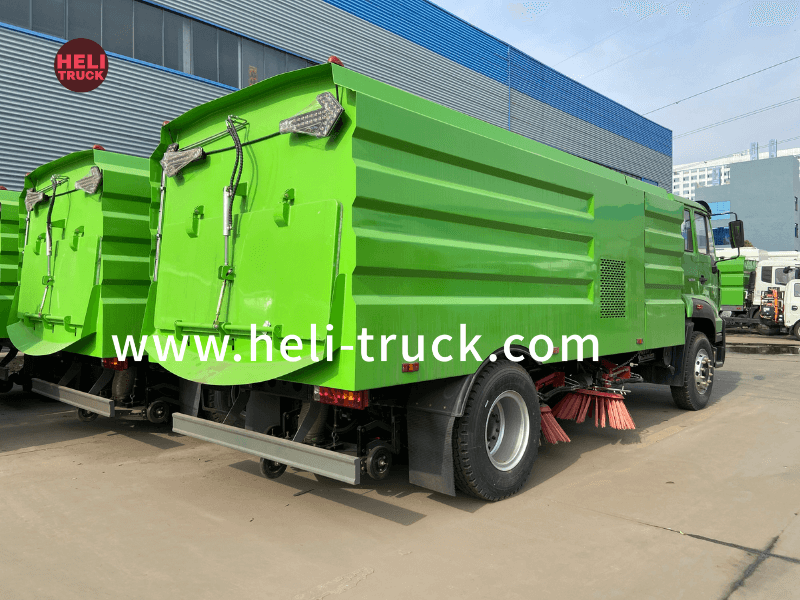Streamlining Waste Management Operations with Garbage Compactor Trucks

Introduction
Waste management is a critical aspect of maintaining a clean and sustainable environment. Waste management companies play a crucial role in collecting, transporting, and disposing of various types of waste generated by households, businesses, and industries. To efficiently handle the collection and disposal of waste, waste management companies rely on specialized equipment, such as garbage compactor trucks. These trucks are essential for streamlining waste collection operations and ensuring that waste is handled in an environmentally friendly and cost-effective manner.

In this article, we will explore the importance of garbage compactor trucks in waste management operations. We will discuss the various types of compactor trucks available, their features and benefits, as well as best practices for using them effectively. Waste management companies looking to improve their operations and maximize efficiency can benefit greatly from incorporating garbage compactor trucks into their fleet.
Types of Garbage Compactor Trucks
Garbage compactor trucks come in various types and configurations, each designed to meet specific waste management needs. The two main types of compactor trucks commonly used in waste management operations are rear loader compactor trucks and front loader compactor trucks.
1. Rear Loader Compactor Trucks: Rear loader compactor trucks are among the most common types of garbage trucks used by waste management companies. These trucks are equipped with a hydraulic compactor mechanism at the rear of the vehicle, which compacts the waste as it is loaded into the truck. Rear loader compactor trucks are typically used for collecting household and commercial waste from bins or containers placed along the roadside.
2. Front Loader Compactor Trucks: Front loader compactor trucks feature a hydraulic compactor mechanism at the front of the vehicle, allowing them to pick up and empty large waste containers directly into the truck. These trucks are commonly used for collecting waste from commercial and industrial facilities that generate large volumes of waste.
Features and Benefits of Garbage Compactor Trucks
Garbage compactor trucks offer several key features and benefits that make them indispensable tools for waste management companies. Some of the notable features and benefits of garbage compactor trucks include:
1. Efficient Waste Compaction: The primary function of garbage compactor trucks is to compact waste, reducing its volume and maximizing the truck's carrying capacity. The compaction process ensures that more waste can be transported in each trip, leading to fewer trips to disposal sites and increased operational efficiency.
2. Improved Hygiene and Safety: Garbage compactor trucks help maintain a clean and hygienic environment by securely containing and compacting waste during collection. This reduces the risk of littering, odors, and pest infestations, promoting a safer and healthier work environment for waste management personnel and the community.
3. Cost Savings: By reducing the number of trips required to transport waste, garbage compactor trucks help waste management companies save on fuel costs, labor expenses, and vehicle maintenance. road sweeper lorry increased efficiency and productivity achieved with compactor trucks translate into cost savings and improved profitability for waste management operations.
4. Versatility and Adaptability: Garbage compactor trucks are versatile machines that can be customized to meet specific waste management requirements. They can handle various types of waste, including general household waste, recyclables, organic waste, and bulky items, making them suitable for a wide range of waste collection tasks.
Best Practices for Using Garbage Compactor Trucks
To maximize the benefits of garbage compactor trucks and ensure smooth and efficient waste collection operations, waste management companies should follow best practices for using these vehicles. Some key best practices for using garbage compactor trucks include:
1. Regular Maintenance: Proper maintenance of garbage compactor trucks is essential to ensure their optimal performance and longevity. Regular inspections, servicing, and repairs should be conducted to address any mechanical issues, hydraulic leaks, or other problems that may affect the truck's operation.
2. Training and Safety Protocols: Waste management personnel operating garbage compactor trucks should receive adequate training on vehicle operation, safety procedures, and waste handling practices. Implementing strict safety protocols, such as wearing personal protective equipment and following proper lifting techniques, can help prevent accidents and injuries during waste collection activities.
3. Route Optimization: Waste management companies should optimize collection routes and schedules to minimize travel time, fuel consumption, and vehicle wear and tear. Using GPS tracking systems and route planning software can help identify the most efficient routes for garbage compactor trucks, reducing operational costs and improving overall efficiency.
4. Waste Segregation and Recycling: Encouraging waste segregation at the source and promoting recycling practices can help reduce the amount of waste that needs to be collected and disposed of using garbage compactor trucks. Implementing recycling programs and educating the public on proper waste sorting can help divert recyclable materials from landfills and reduce the environmental impact of waste management operations.
Conclusion
Garbage compactor trucks play a vital role in waste management operations by streamlining waste collection, transportation, and disposal processes. These specialized vehicles offer efficient waste compaction, improved hygiene and safety, cost savings, and versatility, making them essential tools for waste management companies seeking to enhance their operations.
By investing in garbage compactor trucks and following best practices for their use, waste management companies can increase operational efficiency, reduce costs, and contribute to a cleaner and more sustainable environment. Incorporating garbage compactor trucks into their fleet is a strategic decision that can yield significant benefits in terms of productivity, profitability, and environmental impact.
In conclusion, garbage compactor trucks are indispensable assets for waste management companies looking to optimize their waste collection operations and meet the growing demands of waste management in an environmentally responsible manner. By leveraging the features and benefits of garbage compactor trucks and implementing best practices for their use, waste management companies can achieve greater efficiency, cost-effectiveness, and sustainability in their waste management practices.
